#edward champlin
Text
Just finished Seianus Augustus, an article by Edward Champlin, which argues that Sejanus was not merely an outsider who connived to undermine the imperial family and insert his own descendants into it, but a rising heir-apparent who may or may not have been responsible for all those murders and conspiracies. Thought-provoking stuff, and it's nice to see a "flat" villain figure get more fleshed out.
I am also rotating in my mind the fascinating parallels Champlin draws between Tiberius/Sejanus and Augustus/Agrippa. The "partner of my labors." Saving the emperor from the brink of death. The second-in-command who gets things done, is great at administration and has an interest in the arts. There's even passages strongly suggesting that Sejanus was attracted to men.

But while Agrippa and Augustus' relationship appears to have been solid all their lives, something went terribly wrong between Tiberius and Sejanus. The usual narrative emphasizes Sejanus' manipulations, teachery, and even killing Tiberius' son. Champlin doesn't evaluate how true or false that narrative is, but he does hint that Sejanus might have been destroyed for a different reason: that he too openly revealed his ambitions, and Tiberius came to see him as a threat.
Agrippa, in contrast, usually avoided the spotlight and redirected people's attention back to Augustus. His marriage into the Julian family also appears to have been Augustus' idea, in contrast to Sejanus who actively sought a marriage tie. And Agrippa had an extensive track record in a variety of contexts by the time Augustus granted him the tribunician power (i.e. made him clearly the #2 guy in the empire), while Sejanus' record appears to have been mostly personal service to Tiberius. And, of course, Agrippa's personal life was virtually drama-free - although Champlin points out that we don't know how many of the allegations about Sejanus come from his enemies' smear campaign.
Anyway, a super interesting article, makes me want to reread my biographies of Tiberius and examine Sejanus' role again.
#i do think champlin overstates the certainty of agrippa being augustus' designated heir#like it's very plausible given the signet ring incident but i think it's more likely he'd want agrippa as a regent#for gaius and lucius caesar#edward champlin#sejanus#tiberius#marcus agrippa#jlrrt reads#seianus augustus#octagrippa#jlrrt essays
58 notes
·
View notes
Text

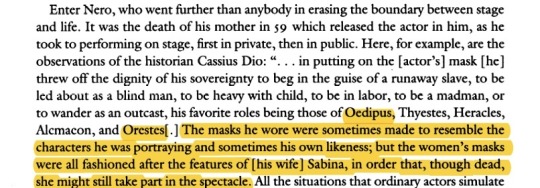
Nero Reconsidered; Edward Champlin
7 notes
·
View notes
Text
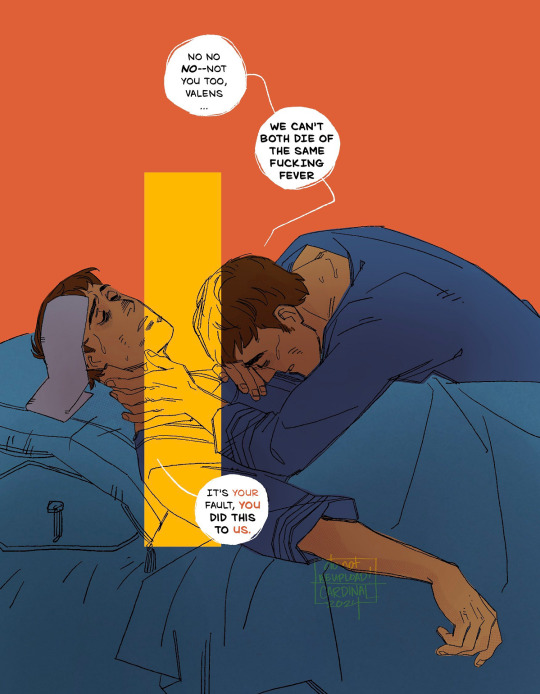

Then, on his arrival in Constantinople, after much counsel with himself, considering that he was already unequal to the amount of pressing business and believing that there was no room for delay, on the twenty-eighth of March he brought the aforesaid Valens into one of the suburbs and with the consent of all (for no one ventured to oppose) proclaimed him Augustus. Then he adorned him with the imperial insignia and put a diadem on his head, and brought him back in his own carriage, thus having indeed a lawful partner in his power, but, as the further course of our narrative will show, one who was as compliant as a subordinate.
No sooner were these arrangements perfected without disturbance than both emperors were seized with violent and lingering fevers--
AM 26.4.3-4
this was one of those illustrations that was originally supposed to be a 5 page comic until I realized I don't know anything about later roman empire architecture or visuals or art or anything, so we'll revisit that later. maybe
for right now though, these two are fascinating. we have two brothers acting as one body, even becoming ill in tandem with each other, it's giving This Throne Is Cursed. like, the last time I read about emperors coming down with life threatening illnesses, it was Caligula, and that moment in his biography marked a very specific tone shift. I spent the rest of the (first) time reading about Valens and Valentinian waiting for something comparable to Caligula's reign to happen lmao (Dio 59. 8. 1-2)
and since Caligula was already on the mind, I started thinking about Tiberius: I think he would've loved these two since he had a whole thing about twin-ification and brothers and etc etc etc. ofc, Rome is both a Mouth and a Tomb, so it's going to go badly for someone/everyone eventually, but honestly I think that Valentinian and Valens were the best we could've hoped for. like it could've been so much worse
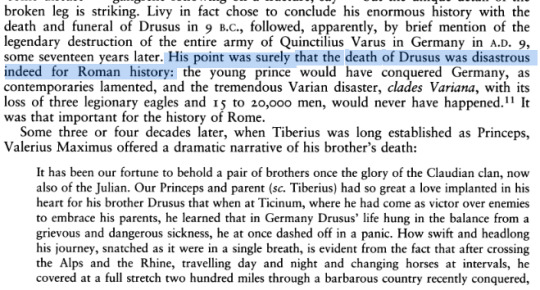









Tiberius and the Heavenly Twins, Edward Champlin
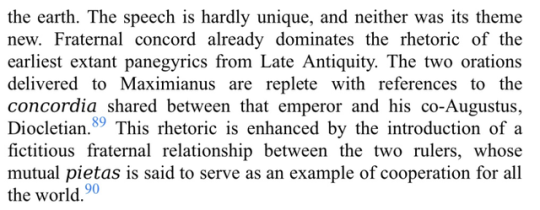
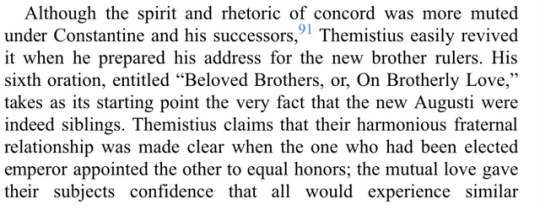

Failure of Empire: Valens and the Roman State in the Fourth Century A.D, Noel Lenski
⭐ I have a tip jar (ko-fi)!
⭐ and other places I’m at! bsky / pixiv / pillowfort /cohost / cara.app
#(drawing hearts around valens) hiiiiiiiiiiiiiiii#roman empire tag#drawing tag#every day i think about valentinian bringing his brother into this and wondering how valens felt about it#especially since the over all arc is that he's constantly just trying to tread water managing everything from six different fronts#did you ever want things to go back to how they were!!!! did you dream of simpler times!!!!!! when it was just hard work and dirt#under your nails instead of the horrible scale of empire choking you out to the very end!!!!!!!!! did you hate your brother for it#im normal about valens. btw. (<<<said by a guy who made valens his icon on his main art blog)#anyway. (claps hands together) im going to go and write about bonifacio and mabini and lucan and crassus and the pharsalia#and mabini's writings on a failed revolution and bonifacio haunting the collective memory#i gotta condense it down to a thousand words. ideally. we are rambling around at around 2k and its unwieldy#valens#valentinian I#later Roman Empire tag
155 notes
·
View notes
Note
hey !! i know fuck all about nero/that era in general (apart from some vague backstory on lucan) but your blog is making me v v curious. are there any books or resources you'd recommend for learning more about him ?
HELLO glad to hear you became interested in nero due to my neroposting [grins]
the most basic sources everyone usually starts with are suetonius [life of nero from the twelve caesars] and tacitus [annals] but as always when reading these you need to take it with a grain of salt and be critical of their claims these guys love drama . ok place to start with and then when you have the context from it you can read the more modern takes about nero and current-day research
for modern books you have edward champlin with 'nero' [link to the internet archive scan. if its not available try again later] and also his article 'nero reconsidered' [jstor]. myriam griffin's 'nero: the end of a dynasty' [internet archive again] [NOTE i havent actually read this one but ive seen people say its good. once i read it i will talk about too].
if you somehow happen to speak either polish or russian [im fairly sure these are the only languages this book can be found in] you have aleksander krawczuk with 'neron'. no idea if its somewhere for free online but i own a physical copy and could scan it if needed
theres also the SIEN . just click the link and read the intro page to understand whats going on there and the articles they offer. some parts of it arent in english but i think you'll survive
[shout out to @/kunstkamera1714 for linking this site months ago when i asked for more unknown sources !]
once you know basic nero lore you can get into deeper super secret vip nero lore [less known fun facts etc.] like how hes in the biblical apocalypse [beast 666 + nero redivivus legend]
11 notes
·
View notes
Note
well i am asking about your nero pdfs
there are many books & nero biographies that give a general analysis of nero's character and/or his principate and are easy to find + access (i always recommend edward champlin and myriam griffin), but aside from these obvious sources, here are some interesting pdfs/articles that i've come across with nero trivia i have not found elsewhere
neronia electronica is an electronic review in several parts, most articles are in french (i do read french & can translate for anyone interested), but some are in english - this is where i've learned that nero wrote his own version of euripides' bacchae
not a pdf, but here is a good link on nero as the antichrist in christian lore. and check out the emperor nero in talmudic legend by s.j bastomsky for nero in jewish lore.
georgios andrikopoulos' magic and the roman emperors has a chapter on nero starting from p.55 describing his interest in the occult and his relationship with tiridates (magus king of parthia). btw, there is a mysterious mention of nero owning a "man eating monster from egypt" for sacrificial purposes - that was probably a crocodile, lol
david braund's treasure trove and nero is about nero's failed search for queen dido's legendary carthaginian treasure, which is also a nero story i didn't know.
lastly, nero and sporus again by michael charles is a good debunking of the (in my opinion piss poor) claim that sporus may have been tiberius' illegitimate heir, but the one interesting piece of information that i have found in it is that there were rumors about nero and otho having been lovers in their younger years. lmao imagine.
this is what comes to mind for now... im always learning about nero & since i am learning about so many other things at the same time i always feel like i'm behind tbh. my current writing project involves nero soo in the upcoming years i will probably know a lottt more and have a lot more pdfs lol but i'm planning on publishing my research on this blog anyway ✌️😊
21 notes
·
View notes
Text

Champlin is roasting Suetonius.
[Edward Champlin, Nero, commenting on Suetonius Otho 3.]
5 notes
·
View notes
Text

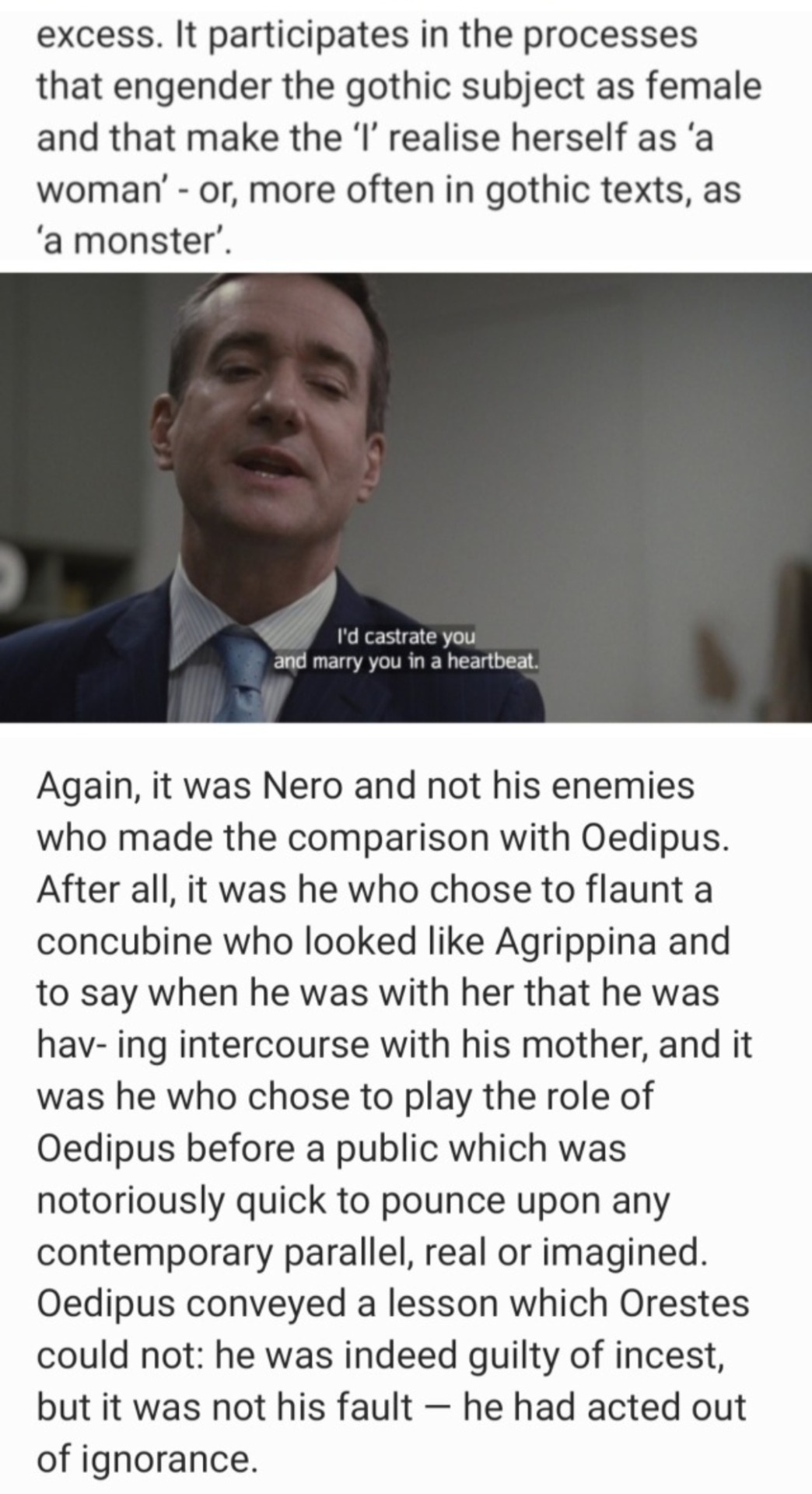
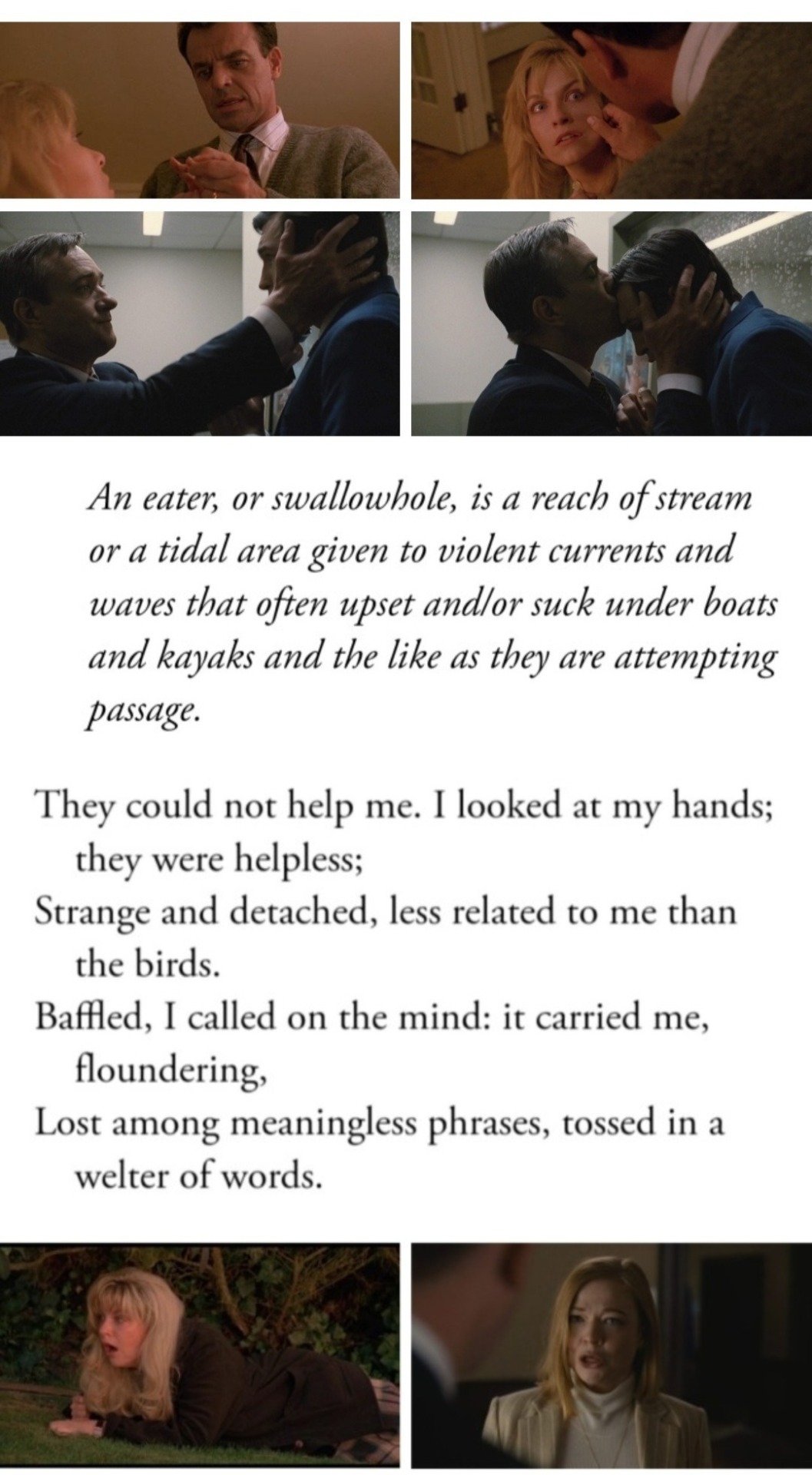


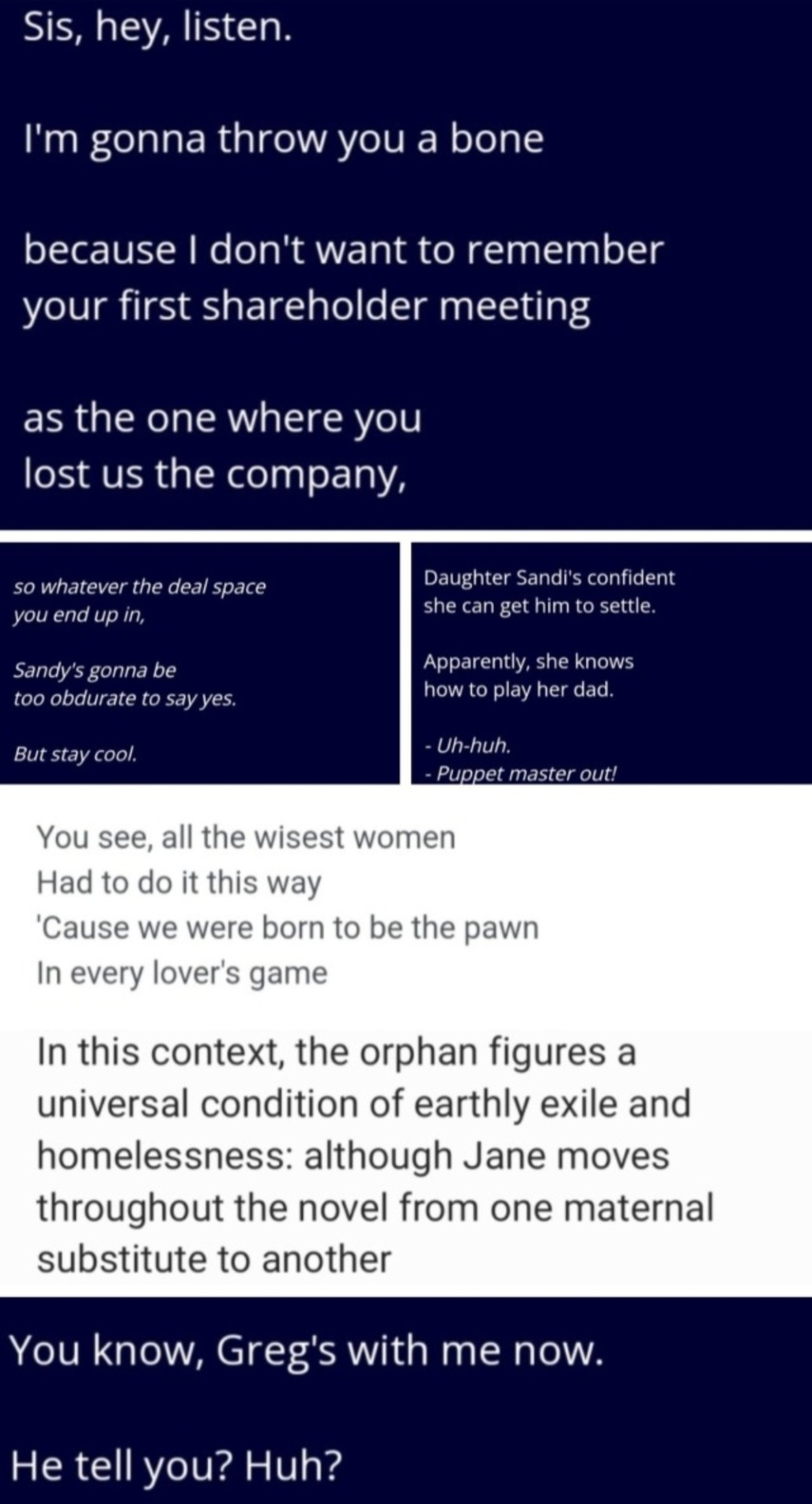




Kendall's Behind the Scenes Protection of Roy Family From Itself Part 2b: The Gothic Horror Reality and Kendall's Gripes and Strategy Within It
Masterlist
Part 1 Part 2a
Non Succesion
The Story of Us by Taylor Swift- 1
?-5
He Doesn't Know Why by Fleet Floxes-4
A Burning Hill by Mistki-6
Twin Peaks Fire Walk with Me-8,12,13,19
Gothic Forms of Feminine Fictions by Susanne Becker-9,21
Nero by Edward Champlin-11
William Kitteridge-17
Inhibited by Louis Untermeyer-18
Frankenstein by Mary Shelley-24
Mastermind by Taylor Swift-27,33,44,47
Family Likeness: Sex, Marriage, and Incest from Jane Austen to Virginia Woolf by Mary Jean Corbett-34
Art of War by Sun Tzu-48
Succesion
3.3-2,3
1.1-7
3.7-14,15
3.1-22
1.5-23
3.5-20,25,30,31,32
1.2-26
3.6 -28,29
3.4-10,35,36,37,38,39,40,41,42,43
2.2-46
2.6-45,47
3.8/3.9?-49,50
1.3-51
6 notes
·
View notes
Text

Nero Reconsidered, Edward Champlin
#illustration ideas. assembling in my mind right now. the terrible family dynasty sure is something!#book club tag#roman empire tag
6 notes
·
View notes
Text
Love Kernels - 23 & 24 May

CAST & CREW
- Rachel Bloom is hosting Group Hug, a fundraiser for Miry’s List, together with Milana Vayntrub, on 1 June in Largo at the Coronet in LA (USA).
- Santino Fontana (Greg) and Donna Lynne Champlin (Paula) will play Promises, Promises in concert on 25 June at the Merkin Concert Hall, New York (USA). You can get your tickets here.
- Vincent Rodriguez III (Josh Chan) will teach an On-Camera Intensive class at Actors Connection in New York on 8 June.
- Fugues sits down with Tovah Feldshuh (Naomi Bunch) to talk Gilda’s Balcony, LGBTQ support, and Broadway, among other things. You can still go see Gilda’s Balcony at the Sylvan Adams Theatre in Montreal (Canada) until 7 June.
- Emma Willman (Beth) plays a special PRIDE event at the Blue Note in Napa, California (USA) on 22 June.
You can also hear her on the Kritical Kane podcast.
- Olivia Edward (Madison Whitefeather) sang original song No One Should Feel Alone on the Today show.
- Podcast The Adam Carolla Show talked with Jay Hayden (Dr. Daniel Shin) about having his own building and design firm, Station 19 and they play a new Movie Memorabilia guessing game called Hollywood Hand-Me-Downs.
REVIEWS & META
- Vulture includes Crazy Ex-Girlfriend in a list of 100 Essential TV Comedies.
FANDOM
- Podcast A Bunched Lunch talks about Let’s Generalise about Men.
- Trivia time again! You can play Crazy Ex-Girlfriend trivia at McHale's Bar & Grill in New York (USA) on 13 June.
- @nonbinarysasquatch shares some episode discussions: Josh Just Happens to Live Here!, Josh’s Girlfriend is Really Cool!, I Hope Josh Comes to My Party! and I’m Going on a Date With Josh’s Friend!.
- @thedupshadove muses on Gettin’ Bi.
A calendar with all the cast & fandom events mentioned in this newsletter can be found here
#rachel bloom#santino fontana#donna lynne champlin#vincent rodriguez iii#tovah feldshuh#emma willman#olivia edward#jay hayden#song analysis#trivia#episode discussion
1 note
·
View note
Photo

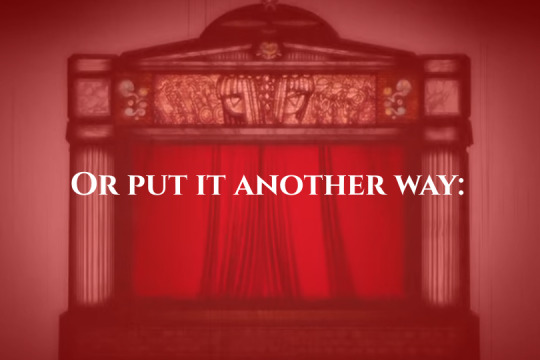
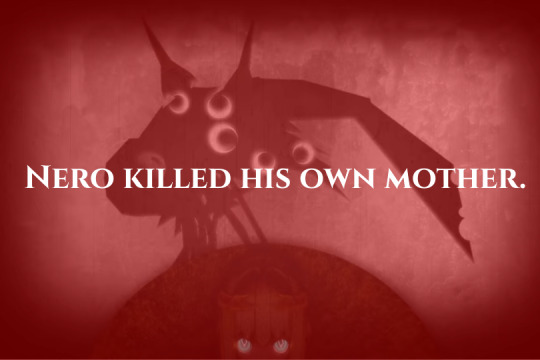
- Roman graffiti (translated by Edward Champlin)
#fate series#nero claudius#fate/extra#last encore#fate/grand order#fgo#amateur classics hour#bad photoshop#baby's first pretentious aesthetic picset
10 notes
·
View notes
Photo
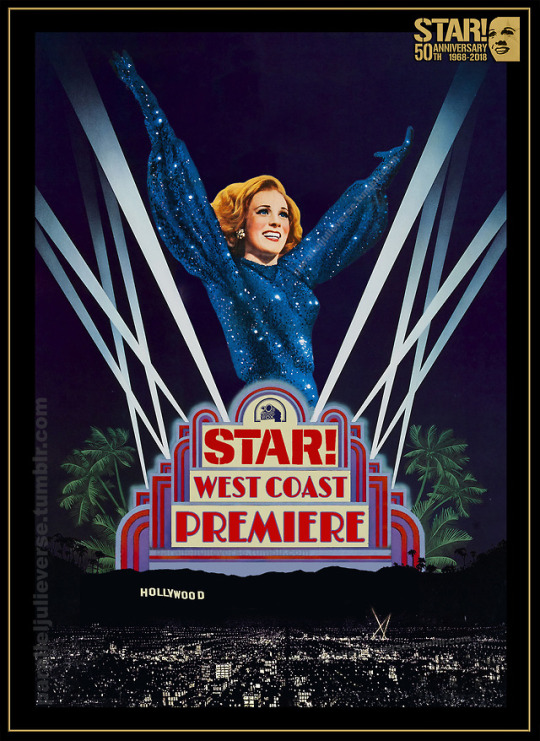
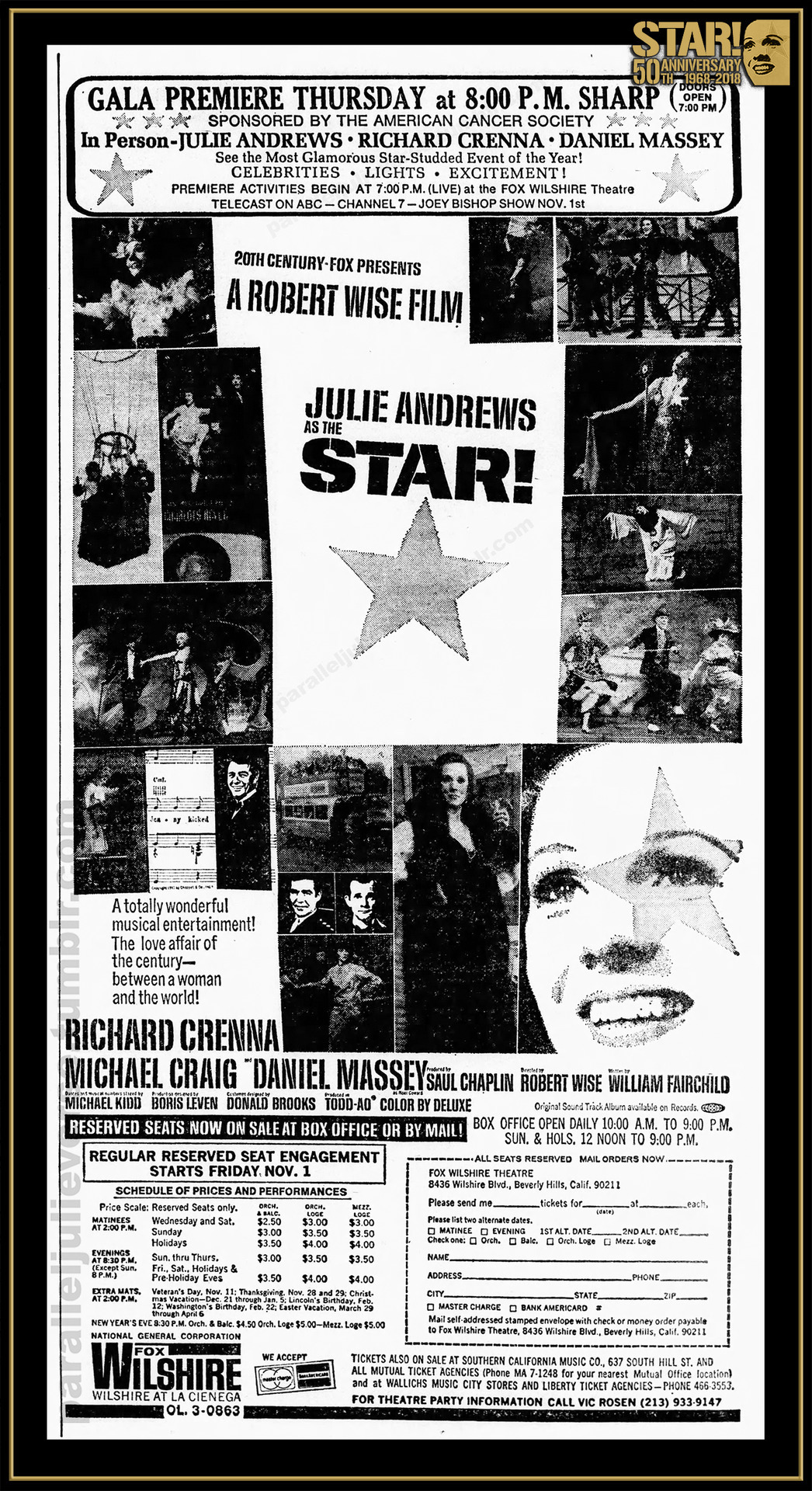
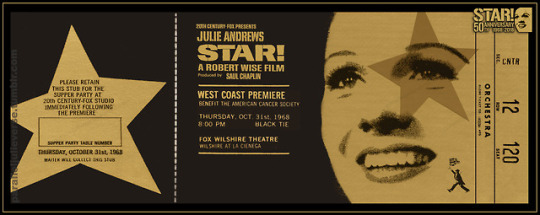
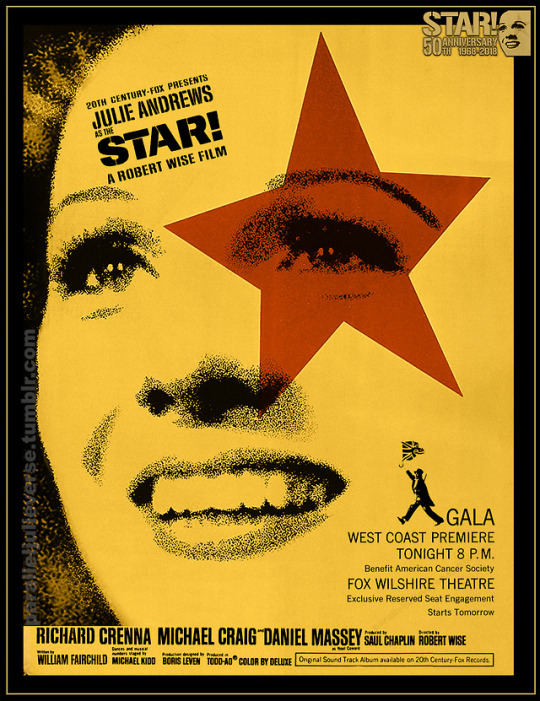
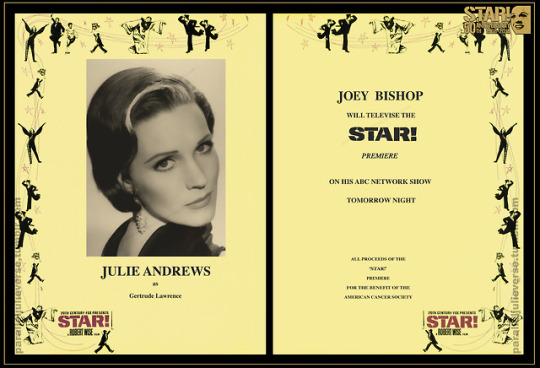
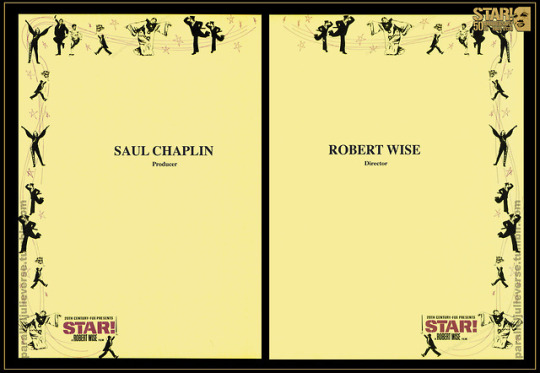
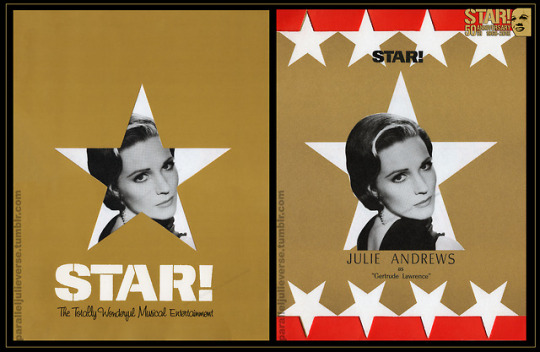
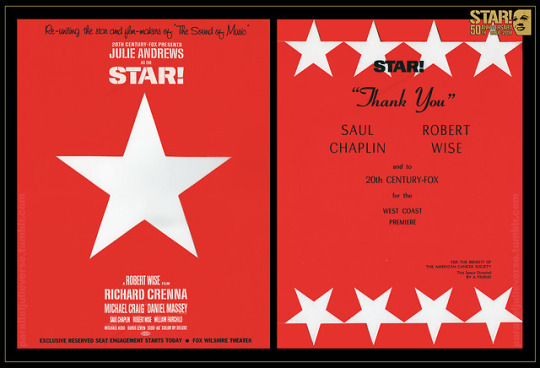
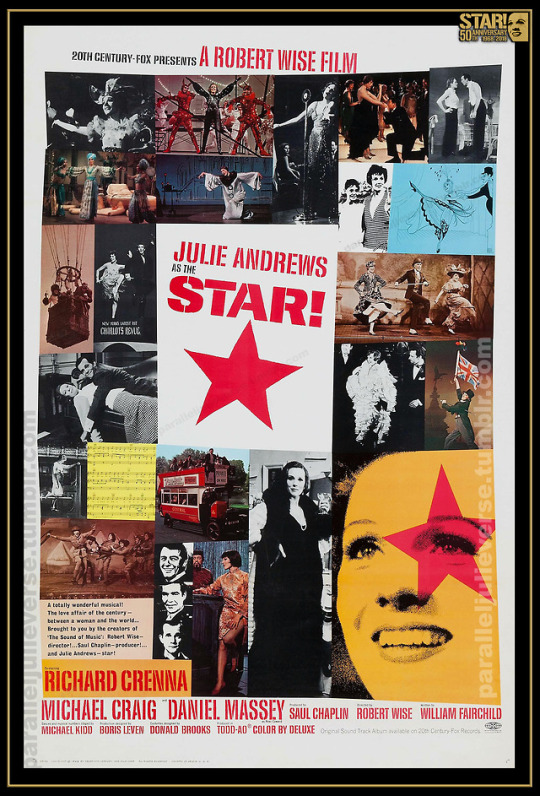
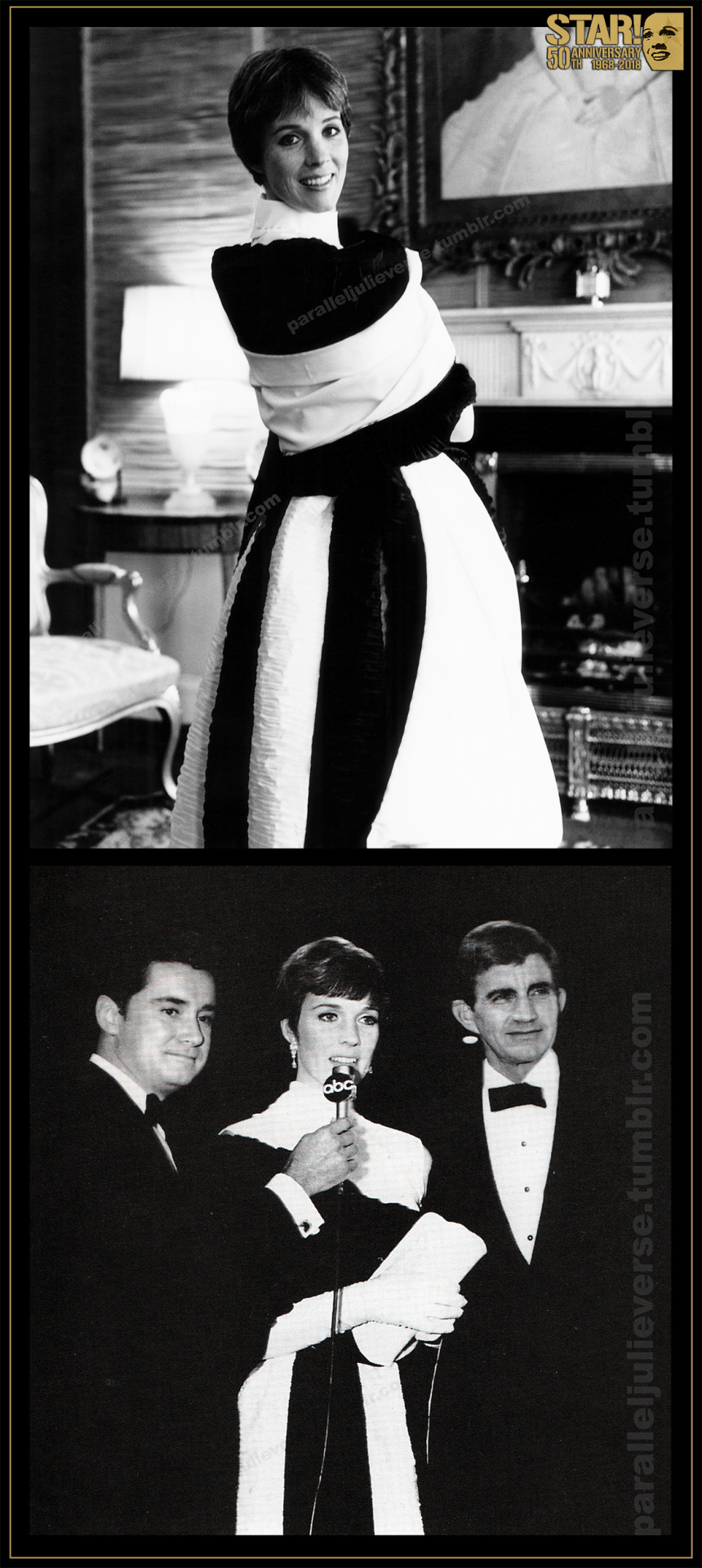
Westward, Ho: Star! premieres in Hollywood, USA
The week after Star!’s gala debut in New York, the film continued its sea-to-shining-sea North American roll-out with a West Coast Premiere on 31 October 1968. Held at the historic Fox Wilshire theatre in Beverly Hills, the West Coast premiere had all the hoopla and razzmatazz of an old-school Hollywood opening. Arc lights swept the night skies, a brigade of crisply uniformed ushers stood honour guard, and gleaming black limousines ferried a host of Tinseltown movers-and-shakers to the red carpet entrance of the art deco picture palace. Crowds of fans and onlookers jostled in cordoned viewing areas as Army Archerd and a young Regis Philbin interviewed notable arrivals on the media dais, highlights of which were later telecast on The Joey Bishop Show.*
By this stage, Julie was back in Hollywood wrapping up filming for Darling Lili so, happily, this was one premiere she could attend. Accompanied by Blake Edwards –– quaintly described in the press as her “gentleman friend” (Fay: IV-1) –– Julie looked every inch the grand Hollywood star in the eye-catching designer outfit she’d had made, but never got the chance to wear, for the London opening: a sleeveless gown of pleated ivory linen with contrasting coffee panels and matching pleated linen stole. “[P]leated linen doesn’t crush,” explained Julie –– showing that, beneath the haute couture glamour, she’d lost little of her no-nonsense English pragmatism –– “That’s important when you have to think of photographers” (Lambert: 8). And photographers were, indeed, out in full force. Because the premiere marked one of Julie’s first public outings since returning to the US, she could barely move all night “without a cordon of photographers with cameras at ready” (Fay: IV-1).
Organised as a benefit for the American Cancer Society, tickets for the West Coast premiere sold at $100.00 a head, with an additional $50 per couple for the after-show supper (Fay: IV-1). There was no shortage of well-heeled takers with the capacity audience of 2500 first-nighters reading like a glittering honour roll of both Old and New Hollywood: Edward G. Robinson, Rudy Vallee, Myrna Loy, Gregory Peck, Buddy Ebsen, Agnes Moorehead, Buddy Rogers, George Burns, Marge and Gower Champion, Jerry Lewis, Pat Boone, Eva Gabor, Ann-Margret, Phyllis Diller, Raquel Welch, Nancy Sinatra, Charles Bronson, Tom Selleck and many more. There was also a strong show of support from Julie’s own circle of celebrity friends and associates: Carol Burnett, Ross Hunter, Roddy McDowall, Henry Mancini, Edward Mulhare, and Charmian Carr (Fay: IV-1; Kay: 25; “Premiere of ‘Star’ Set Tonight”: IV-16).
Sprinkled among the celebrity-packed audience were some fortunate members of the general public. Two anonymous film industry benefactors bought out blocks of seats in the upper balcony and “distributed the tickets to…medical and theatre arts students from USC and UCLA” (Fay: IV-1). While the Gesh Agency purchased another block of tickets for donation to servicemen on furlough from the war in Vietnam (ibid.). Not sure how enthused red-blooded GIs would have been by a Julie Andrews screen musical but, hey, it was a free night out!
One surprise member of the audience who was thrilled beyond belief was Jan Versaw, a teenage Julie Andrews superfan from Contra Costa county in Northern California. Versaw, who had reportedly seen The Sound of Music 23 times, made the journey down to Los Angeles with the express hope of meeting her idol at the premiere. She even lugged along her 23-pound (10.5 kg) Julie Andrews scrapbook! The eager fan rocked up to the Fox Wilshire theatre at 4:30a.m. –– “I thought it would be crowded like the Rose Parade,” she explained –– and huddled, waif-like, under the marquee with her scrapbook. She first got the attention of the janitor, then the theatre manager, then a Fox PR rep and, finally, later that night, she got to meet Julie herself. Not only that, but Julie invited her in to see the film. “It’s unbelievable!”, cried the starstruck young woman (Fiset: 21; “Happened Like”: B4).
Press reports relate that the first night audience gave Star! a thunderous standing ovation. Following the screening, a fleet of buses was on hand to chauffeur 700 VIP guests to the after-show Supper Ball at Twentieth Century-Fox Studios. Driving through the backlot sets erected for Hello, Dolly!, Fox’s next big roadshow musical with an exclamation mark, partygoers were delivered to the doors of the studio’s massive Stage 21 which had been done up especially for a dazzling Star!-themed ball:
“[D]ebarking passengers stepped into an exact replica of the foyer of Gertrude Lawrence’s New York apartment. Behind this was the huge ballroom, carpeted (except for the dance floor), completely draped and lighted by a dozen or more blazing crystal chandeliers. Here at tables entered with masses of yellow and white flowers in tall epergenes, they ate a midnight supper…catered by Chasen’s [and] danced to the music of Peter Duchin and his band, flown in from New York” (Kay: 25).
Described as “probably the smoothest-paced premiere in history,” the evening was deemed a glorious success, netting a whopping $143,000 for the Cancer Society (Kay: 24).
Any morning-after headaches at the studio would have been somewhat eased by the West Coast reviews of the film which were markedly better than the preceding week’s notices from New York. In fact, James Bacon of the Los Angeles Herald-Examiner used his review to take direct aim at the film’s vituperative East Coast pans:
“Let me give it to you straight. I’m an unusual type critic. I’m a sucker for good entertainment. And ‘Star!’ which premiered the other night at the Fox Wilshire is loaded with it. It’s a tour de force for Julie Andrews…I have read most of the other reviews from New York, where writers lamented the absence of deep neurotic conflicts in the autobiography of Gertrude Lawrence. And after seeing the movie so forewarned, I came away convinced…that most professional critics don’t really like to be entertained. ‘Star!’ is the type of picture no one will like but the public. It will not make as much money as ‘Sound of Music’ but it will come close” (Bacon: D6).
The trades all gave very positive notices, homing in on –– and, possibly, talking up –– the film’s potential for commercial success. Film Daily wrote:
“The production has the built-in ingredients that assure assure mass audience appeal. Sometimes the entertainment is brilliant, occasionally overwhelming and in moments uncertain and becalmed….The versatility of Miss Andrews is as remarkable as her personality is endearing…[She] rac[es] through a series of songs and production numbers like an exuberant flame” (Herbstman: 3).
BoxOffice declared it “a veritable entertainment goldmine…that is almost monumental in its scope and detail”:
“And riding above it all, never once over-shadowed by the globe-spanning locations, is the phenomenal Julie Andrews, now truly the Queen of the Roadshows. In its way, ‘Star!’ is as much a tribute to her as it is a musical biography of Gertrude Lawrence. It’s a new Julie Andrews that audiences will be responding to. As Gertrude Lawrence she conveys a three-dimensional character, not entirely sympathetic, but a woman of ambition and drive, fired by her own ego and able to trade racy epithets with as much ease as she changes her lovers. It’s a spectacular performance that will surprise and please her many fans, and quite possibly bring a whole new legion of admirers into her camp. She is the ultimate attraction here, and she carries the film like a quarterback breaking out for a touchdown” (Verrill: 11).
Variety had already reviewed the film upon its earlier London release offering warm, if slightly reserved, praise:
“Like many hardticket pix it’s overlong at 165 minutes…and occasionally sags between musical numbers but, springing from William Fairchild’s witty and knowledgeable screenplay, the cast and team of redoubtable technical contributors have helped to turn out a pleasing tribute to one of the theatre’s most admired stars…‘Star!’, filmed in Todd-AO and marking the first reunion of Miss Andrews and Wise since their fantastically successful ‘Sound of Music’ should, with Miss Andrews’ marquee magnetism, cause plenty sweet music at the box-office all over again” (‘Rich.’: 6).
Possibly the most muted, but also most reasoned, Hollywood review came from Charles Champlin of the Los Angeles Times:
“No movie about Gertrude Lawrence with Julie Andrews can be all bad, but ‘Star!’ which opened with great ceremony on Wednesday night…is not all good either…It is, as they always say in the ads, lavishly mounted. It offers full musical value for the money, and…Miss Andrews, as ever was, is clear-voiced and full of warmth….Yet for all these positive attributes and the obvious loving care with which the whole project was put together, ‘Star!’ at its best is merely pleasant and not for a single moment really magical…[T]he result, despite nice arrangements, crisp staging by Michael Kidd, a tuneful period, rich costumes and rich sets, is not a bad musical but a disappointing one which should have amounted to much, much more” (Champlin: IV-1, 17).
As in New York, business for Star!’s second US engagement started with a robust flourish. In its first week at the Fox Wilshire, the film took $45,000 in what Variety described as a “loud start” (“Hardticketers”: 9). However, again like New York, ticket sales quickly slumped with the weekly updates of grosses reading like a veritable cartoon graph nosedive:
Week 1: $45,000
Week 2: $29,000
Week 3: $25,000
Week 4: $21,000
Week 5: $18,000
Week 6: $16,000
Come Week 10, grosses had dipped below $10,000 and, by Week 15, they were under $5,000. In its 20th and final week at the Fox Wilshire, Star! took what Variety called a “drab $3,000″ (“L.A. Perking Up”: 9). By point of comparison, other roadshow musicals screening in the L.A. area that week were all doing very brisk business. Funny Girl, which was in its 24th week of release at the Egyptian, grossed $29,000 and Oliver! raked in $27,500 in its 14th Week at the Beverly. Even the poorly received Chitty Chitty Bang Bang managed to outperform Star! with $12,000 in its 14th week at Grauman’s Chinese Theatre (ibid.).
It was a scenario being repeated across the country at almost all the film’s North American roadshow engagements. To say the poor returns from Star! caused concern back at Fox would be an understatement. Studio execs went into a tailspin of their own and would embark on a series of increasingly desperate –– and desperately ill-judged –– salvage attempts. But that, as they say, is a tale for another time…
Notes:
* Some commentators have claimed that the West Coast premiere of Star! was dismally under-attended. Richard Stirling (2007) writes, “There was not a soul in sight” (211), using as putative evidence two comments taken out of context from Robert Wise and Jan Versaw, the teenage super-fan mentioned in the body of this post. Matthew Kennedy (2014) –– who lists Stirling as a primary reference and was likely just recycling the former’s dubious research –– also asserts, “Few others bothered to attend [the premiere], including fans” (154). The claim is simply untrue. Press reports, photos and television coverage of the premiere reveal that, not only was the audience filled to capacity, there were several hundred spectators grouped outside. Not exactly Beatlemania, but neither was it ‘tumbleweeds blowing down Wilshire Blvd’ as suggested by these sensationalist misrepresentations.
Sources:
Bacon, James. “Julie’s ‘Star’ Elegant Entertainment.” Los Angeles Herald-Examiner. 4 November 1968: D6.
Champlin, Charles. “Movie Review: ‘Star!’ Depicts Life of Noted Actress.” Los Angeles Times. 1 November 1968: IV-1, 17.
Fay, Sharon E. ‘Star!’ Premieres in Name of Charity.” Los Angeles Times. 17 September 1968: IV-1, 20.
Fiset, Bill. “The Lost Veneration.” Oakland Tribune. 15 November 1968: 21.
“Happened Like in Movies.” San Bernadino County Sun. 2 November 1968: B4.
“Hardticketers Help L.A. ‘Star’ Loud $45,000.” Variety. 6 November 1968: 9.
Herbstman, Mandel. “Review of New Film: STAR!” Film and Television Daily. 23 October 1968: 3.
Kay, Frances R. “Stars Shine at Premiere.” Valley News. 5 November 1968: 24-25.
Kennedy, Matthew. Roadshow!: The Fall of Film Musicals in the 1960s. Oxford: Oxford University Press, 2013.
Lambert, Eleanor. “Writer Finds A Lot Can Happen Between Julie’s Dress Fittings.” The Dispatch. 18 July 1968: 8.
“L.A. Perking Up.” Variety. 26 March 1969: 9.
“Premiere of ‘Star’ Will Benefit Cancer Society.” Los Angeles Times. 17 August 1968: III-8.
“Premiere of ‘Star’ Set Tonight.” Los Angeles Times. 31 October 1968: IV-16.
‘Rich.’ “Film Review: Star.” Variety. 24 July 1968: 6.
Stirling, Richard. Julie Andrews: An Intimate Biography. London: Portrait, 2007.
Verill, Addison. “Feature Review: ‘Star!’” BoxOffice. 28 October 1968: 11.
Copyright © Brett Farmer 2018
#julie andrews#star!#star!50#fiftieth anniversary#gertrude lawrence#Robert Wise#film premiere#old hollywood#Hollywood Studios#Twentieth Century Fox#fox wilshire#beverlyhills#blake edwards
12 notes
·
View notes
Text

I would like to thank @garland-on-thy-brow for introducing me to academia.edu, and Edward Champlin for delivering my new favorite sick burn.
(Champlin, Seianus Augustus, p.362)
32 notes
·
View notes
Text
2023 READING LOG
JANUARY
-> Books:
HURSTON, Zora Neale; Their Eyes Were Watching God
WILLIAMS, Tennessee; A Streetcar Named Desire
-> Essays & articles:
CHRISTENSEN, Joel; How do chatbots dream of electric Greek heroes?
DYHOUSE, Carol; Why Are We So Afraid of Female Desire?
EDWARDS, Stassa; A Little Madly: Hysteria at the Moulin Rouge
HOOKS, bell; Romance: Sweet Love
LAING, Olivia; NYC blue: what the pain of loneliness tells us
LIEBERMAN, Jeffrey A.; “The Miracle Cure”: A Brief History of Lobotomies
LORDE, Audre; The Uses of the Erotic: The Erotic as Power
SHUSHAN, Gregory; Near-death experiences have long inspired after life beliefs
STADONILK, Joe; We’ve always been distracted
TÁÌWÒ, Olúfémi; The idea of ‘precolonial Africa’ is vacuous and wrong
WYPIJEWSKI, JoAnn; How Capitalism Created Sexual Dysfunction
FEBRUARY
-> Books:
DOUGLASS, Frederick; Narrative of the life of Frederick Douglass
WINTERSON, Jeanette; 12 Bytes: How We Got Here, Where We Might Go Next
-> Essays & articles:
BLACK, Bob; The Abolition of Work
BURDEN-STELLY, Charisse; How Black Communist Women Remade Class Struggle
COBB, Michael; Bigmouth Strikes Again
GOODLAD, Lauren M.E.; Now The Humanities Can Disrupt “AI”
HALBERSTAM, Jack; Towards a Trans* Feminism
HARVEY, Katherine; Medieval babycare
ROTHFIELD, Becca; A Body of One’s Own
RUKES, Frederic; The Disruption of Normativity: Queer Desire and Negativity in Morrisey and The Smiths
STRINGER, Julian; The Smiths: Repressed (But Remarkably Dressed)
VENKATARAMAN, Vivek V.; Lessons from the foragers
MARCH
-> Books:
AMADO, Jorge; Gabriela, Clove & Cinnamon
-> Essays & articles:
ALEXANDER, Amanda; Making Communities Safe, Without the Police
BOURDÉ, Guy; The philosophies of history
ELLIOTT, John H.; An Europe of composite monarchies
ERNAUX, Annie; A Community of Desires
HARCOUT, Bernard E.; Policing Disorder
JABBARI, Alexander; After the mother tongues: what we lost with Persianate modernity
MANTEL, Hilary; Anne Boleyn: witch, bitch, temptress, feminist
MANTEL, Hilary; Holy disorders
MANTEL, Hilary; Night visions
MANTEL, Hilary; No passport required
MANTEL, Hilary; The shape we’re in
MINER, Horace; Body Ritual among the Nacirema
RUSSEL, Francey; What It Means to Watch
WEBB, Claire Isabel; Cosmic vision
APRIL
-> Books:
MISHIMA, Yukio; Sun and Steel
OLADE, Yves; Bloodsport
-> Essays & articles:
BATESON, Gregory; A Theory of Play and Fantasy
CÉSAIRE, Suzanne; The Great Camouflage
CHARALAMBOUS, Demetrio; The Enigma of the Isle of Gold
DAVID, Kathryn; How Stalin enlisted the Orthodox Church to help control Ukraine
SINGLER, Beth; Existential Hope and Existential Despair in AI Apocalypticism and Transhumanism
WYATT, Justin; The Smiths, Pop Culture Referencing and Marginalized Stardom
-> Short stories:
ELLISON, Harlan; The Man Who Rowed Christopher Colombus Ashore
SAYLOR, Steven; The Eagle and the Rabbit
MAY
-> Books:
PLUTARCH; Life of Sulla
-> Essays & articles:
BRAUDEL, Fernand; Clothes and fashion
CHAMPLIN, Edward; Nero Reconsidered
GARTON, Charles; Sulla and the Theatre
HAY, Mark; The Colonization of the Ayahuasca Experience
HSU, Hua; Varieties of Ether: Toward a history of creativity and beef
PROBYN, Elspeth; Cannibal Hunger, Restraint in Excess
STAR, Christopher; How the ancient philosophers imagined the end of the world
TELUSHKIN, Shira; Meet Eva Frank: The First Jewish Female Messiah
#reading log#articles#essays#reading recommendations#reading recs#feminism#psychiatry#leftism#communism#anarchism#race#nationalism#imperialism#anthropology#anti-work#the smiths#tech#ai#ecology#religion#occult#bob black#thomas sankara#hilary mantel#audre lorde#bell hooks#annie ernaux
39 notes
·
View notes
Note
i think you said in response to a previous ask that octavian and antony are a Worse version of the brutus and cassius gladiator-statesman dynamic, and that octavian and agrippa are a different thing that wasn't relevant at the moment. i was wondering if you meant that octavian and agrippa are a thing outside the gladiator statesman dynamic (and if so, any ideas on why that is?) or that they were a different version of that dynamic?
also, this is the same anon who asked about using some of your quotes in a presentation! it ended up going pretty well considering most people there weren't unwell about dead romans!
octavian and agrippa are thing outside of that dynamic! this is, ofc, a YMMV type of thing, this is very much getting into creative/thematic nonsense that I like to play with as someone who makes comics
but basically the cut off for the statesman-gladiator/politician-warrior dynamic is philippi. things get hazy leading up to philippi because julius caesar has already eroded a core element to rome's structure, which is that it's made HIM the focus point of politics. there is no longer room for horizontal alliances of power amongst men vying for prestige, there is only room for vertical loyalty (so like, a more extreme version of patronage and bossism politics) (and disloyalty! because you get stabbed if you make people unhappy!! you make your body one with the state and people will let you know what they think of you. and the state.)

Antony, Fulvia, and the Ghost of Clodius in 47 BC, Kathryn E Welch
so by the time octavian wins, standing on top of everyone else, the general power structure of rome has changed and it's not going back. it looks the same, and people are going 'nooooo it's still a republic, LOOKS like the republic!' while dragging around decayed corpse, but it's different.
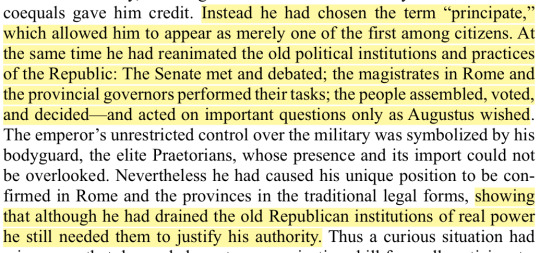

Caligula, Aloys Winterling
octavian and agrippa are co regents, with octavian as the clear head of state and agrippa, who is borderline unwell in his devotion to octavian, and somehow it worked for them. like, for them specifically it balanced out into a partnership.


Ancestor Masks and Aristocratic Power in Roman Culture, Harriet I Flower
in theory, this kind of dynamic (with a domestic politician and a general to enact imperialist policy) would be the blue print that would continue down, and boy did they try. tiberius and sejanus. caligula and macro. good grief. the system of relationships and obligations that allowed this kind of dynamic to show up frequently in the republic falls apart here because power corrupts, baby, and with a state assuming a body, there's no way that power is going distribute itself. everyone is going to want to be that body. except agrippa, who was devoted to octavian, but you can't. replicate that kind of intimacy even if you want to.
so it LOOKS like a statesman-gladiator dynamic, but they're really just co regents in practice, but the actual framework is closer to a king and his knight. they are also. incest adjacent. ground zero for the incest circus that happens later? or maybe something else.
basically the logic for that is the way that octavian kept trying to get agrippa into the family tree to make agrippa his heir prompted this kind of. increasingly more insular behavior. AND THIS TOO


Ancestor Masks and Aristocratic Power in Roman Culture, Harriet I Flower
additionally, I think proximity to octavian-imperial rome dooms a lot of people. agrippa dies before octavian, tiberius' character goes on a definitive downward arc. brother-pairs as rulers, caligula's hellenistic tendencies and the incest allegations with his sisters, the twin-ification of pairs--


Tiberius and the Heavenly Twins, Edward Champlin
--agrippina and nero. Everything Nero Was Doing With Masks And Theater Sure Was Weird. there's a kind of house dynamic going on with imperial rome, but the whole thing is a mouth eating itself. rot. pater patriae. in a permanent state of digestion. etc/
that last one is a thought I'm work shopping, but basically to me all of this is a worse version of the statesman/gladiator dynamic because of the concentration of power.
#like. octavian augustus is this awful vulture that steals from everything and then gnaws away at it#like. taking the vulture accusations away from pompey. octavian augustus outran ALL of you in the Theft Department#ALSO IM GLAD THAT YOUR PRESENTATION WENT WELL! hell yeah!!!#ask tag#(squints at this) i think i got off track. but my thoughts are rarely linear. so. i tried my best. hopefully it is coherent
52 notes
·
View notes
Note
So I have to do a paper on Nero. Are there any facts you could give me about what made him a leader? 😂 sorry I just love your blog btw and you don’t have to. Sorry for bugging you
Salve anon! Unfortunately, I’m probably not the best person to be answering this, as I know probably the least about Nero out of the Julio-Claudians (but I know there are a ton of people on here who do, so please feel free to comment if you do!)
But, to answer your question, I’d say that what made Nero a leader was his contributions to the public. He focused a lot of his attention on the culture of the empire through extravagant public and private works (i.e. theaters and athletic games). This resulted in a rise in his popularity among the commoners.
I’d recommend looking at Miriam Griffin’s Nero: The End of a Dynasty and Edward Champlin’s Nero.
#comments are welcome!#nero is actually a really fascinating guy#I just didn't study him as much as the other four
1 note
·
View note
Text
“One of the letters to Younger Pliny, written aroung 105, contains the obituary of a recently deceased friend, Gaius Fannius, who had died while compiling The Deaths of Those Slain or Exiled by Nero” (…) Fannius had dreamed that Nero sat at the end of his bed, read through three volumes of his “crimes”, and gone away. Fannius was horrified to think this meant that his writing would stop where Nero left off reading, and he was right.”
Edward Champlin, Nero
4 notes
·
View notes